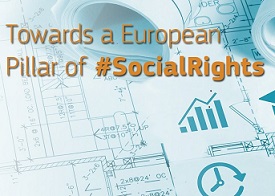Since launching the broad policy package called the “European Pillar of Social Rights” in April of last year, the Commission has followed with a series of consultations (of social partners and of the public) on different elements of the package. FIA considers that there is real political momentum and an encouraging will to make progress on the social dimension of the EU for the first time in years. However, the clock is ticking, as the current Commission will be in place until the elections in 2019, but in practice this year, 2018, is the last year where political initiatives can be seen through to their conclusion. With this in mind, FIA has actively participated in the high number of key consultations and stakeholder discussions that are currently underway, in the hope that solid progress will be made this year.
In responding to these consultations, we have joined hands with sister federations FIM and UNI MEI and submitted our answers as the sectoral federation the European Arts and Entertainment Alliance (EAEA). It is also in this capacity that we represent the sector in the European Sectoral Social Dialogue and as a European Trade Union Federation member of the European Trade Union Confederation (ETUC). We have also participated actively in the wider discussions within the ETUC on all aspects of the social pillar.
In the run-up to the 2017 December holiday period, the EAEA submitted three consultation responses: an overview is provided below. Each responded to an individual policy proposal by the European Commission, while making the key links between them. Each also strongly emphasised that all EU initiatives must be in a logic of upward convergence and must in no way undermine national social or collectively bargained provisions for any workers, including a strict non-regression clause. With regard to the question of whether or not we believe it opportune for the European Social Partners to exercise their right to engage in autonomous collective bargaining on the policy proposals under consultation, the EAEA, in line with the ETUC, shifted its position since the first round of consultations and responded in the negative. This was due to the tight time frame and refusal by the employers to engage in any preliminary and preparatory exchanges. However, social partners should remain close to the process and feedback from their dialogue to the Commission.
The second stage consultation on the Written Statement Directive:
The EAEA submitted its response to this consultation in November 2017. It focuses on reform to improve the scope and coverage of the written statement directive. This directive regulates the written statement provided to employees by their employer to give them a clear overview of their rights and entitlements. The EAEA emphasised the need to reach workers who are in the so-called ‘grey zone’ and who may have an independent or mixed status. We also emphasised the need for collective bargaining for this group. You can read the full response here.
The second stage consultation on Access to Social Protection:
The EAEA responded in December 2017. We emphasized that work to address the challenges of access to social protection for people in all forms of employment cannot be separated from the wider goal of ensuring access to a minimum floor of rights. Lack of access to social protection is clearly one of the major decent work deficits and is highly prevalent in our sector. We emphasised that an inclusive approach should be taken to include all workers, in all forms of employment and work arrangements, including the genuinely self-employed. Many contracts in the Media, Arts and Entertainment sector are of a short-term nature and may take various legal forms. This is a growing trend across many sectors and seems likely to continue into the future. Exclusion can only lead to unequal treatment and unfair practices. You can read the full response here.
Public Consultation on a future European Labour Authority:
This consultation closed early in the New Year. The EAEA responded to welcome the proposal and feed into reflection on the role of such a body. Close institutionalised participation of the social partners in the ELA would be necessary for it to be a driver of real change and to foster new solutions to old problems. Whilst the ELA should have a fully independent executive body, a supervisory organ should be envisaged. This organ should be tripartite, including representatives of the social partners. The EAEA strongly made the case for the labour authority to address the many issues that arise for mobile workers in the EU. Thus it should promote better enforcement of EU labour and social security rights and the fight against social dumping and social fraud in cross-border employment and social security cases. You can read the full response here.





